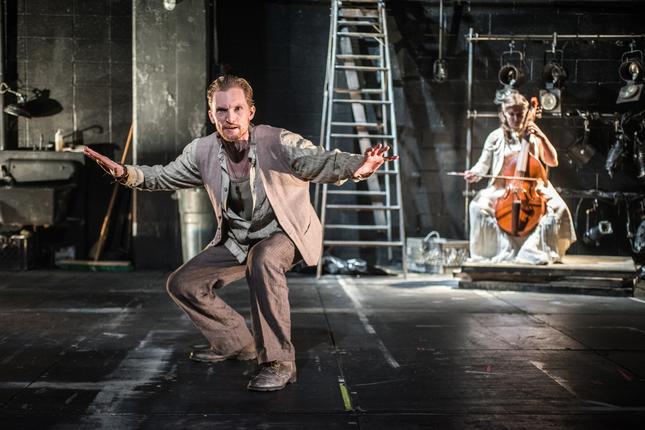Our Unconquerable Memory of the Trojan War
By • January 10, 2013 0 1008

William Shakespeare was supposed to be a pretty fair story teller.
A blind poet by the name of Homer wasn’t so bad, either. His work—his one (two, counting “The Odyssey”) story, told over and over again—continues to compel attention and to bring us back to our core of hearing stories.
A teller, not a writer, Homer was an outloud poet, if he was anything—although we know even less about Homer than we do about Shakespeare.
Homer sang his tales, and they’re still around. “The Iliad” about the war between Greeks and Trojans, with the gods joining in like some Olympian pugilists, starring Achilles, Hector, Agamemnon, Priam, Helen and Paris, and a cast of thousands of warring combatants before the gates of the city of Troy—its other name is Ilium—about 4,000 years ago.
We all know the story. We’re familiar with it from tales told at school and books we were forced to read in college, and movies we saw and plays we saw that used the great war and the Greek warrior-king Odysseus’s eventful journey home as jumping-off points to tell us about ourselves. We saw Kirk Douglas sailing, Brad Pitt fighting and various Helens launching a thousand ships.
But it’s still the same old story—a real fight for love and glory—best told in the semi-dark, around, if not a campfire, at least on a bare and barren stage, by one man, who, if not blind, could pass for the real deal, if he had lived and told the same tale all over the world, on stages, on street corners, amid the tents of other warriors and fighters, in castles for a piece of lamb, in taverns for a drink and a memory
That’s essentially what’s happening at the Studio Theater where artistic director David Muse helmed a production of “An Iliad,” adapted by Lisa Peterson and Denis O’Hare from a Robert Fagles translation of Homer’s epic poem.
It features one man: a ragged man, the story teller, who speaks with such power and clarity, that you believe every word he says, because he sounds as much a witness as a poet—a witness, it should be made clear, to all the brave, ravenously courageous and horrifyingly destructive wars men have ever fought over things they’ve soon forgotten.
Scott Parkinson looks very much the part of a man whom you’d spot for a few drinks in a bar, just to listen to him talk. The talk is about the last weeks of the war, about Agamemnon’s destructive fight with the great warrior Achilles, about the loss of Achilles’s best friend, about his towering rage, about his foretold doom, about the Trojan warrior Hector, about loss and rage, and war’s discordant and affecting music.
It’s not much, and it’s everything. So scruffy-good is Parkinson, so casual, so many-voiced that soon enough you hear the clash of spears and swords, the screams of wounded men, and the anguish of people wounded to their souls with loss. “The Iliad” is as before and always, a great story, but in their adaptation Peterson and O’Hare have made it so much more. It is a huge story, bounding and echoing across lands, borders, time and space. We know without being told that this story has always been about us, about war, about what it does to us, an invention, not of God or gods, but of our own, where men, leaders and spit-upon-privates carrying spears can catch a sense of something god-like and monstrous in the rivers of blood that are spilled.
All that’s there on the stage are the tools of the trade—of story-telling, not war—a trunk, a shaggy coat, a stick, a woman (Rebecca Landell) in a flowing white gown, playing the cello beautifully and serving as a kind of chorus, movie score and subtle carrier of grief to come. There are stage lights that look like masks or discarded armor, but that may be your or my imagination.
Mostly, Parkinson is the teller of tales—sometimes funny, sometimes sage and sagacious, sometimes sarcastic, sometimes like a man carrying old wounds and memories. He tells the tale, but it become something more. It seems to involve everything from the Crusades, to the Persian wars, ancient and modern, to Vietnam, Afghanistan, all those forays by one group of nationals or alliances into the lands of another group of nationals and alliances, to come to grief, to cause great destruction and create new stories over and over again.
That’s the underlying minefield of this tale, the tragedy of mankind, but its surface is full of phosphorus, the hot blood and rage of individuals, their deeds and deeds undone. Parkinson plays all the parts—the ragged poet, but also Hector and Achilles, and Priam and Achilles, the king and the greatest warrior, meeting in the middle of the night after Achilles has killed Priam’s son Hector. The meeting of king and warrior has a calming effect on Achilles after Priam begs for his son’s body. It’s as if the stage suddenly filled up with people in the silence and became dotted with tears.
Parkinson also follows Homer’s telling of the tale. This poet stops before the creation of the Trojan horse, the foretold death of Achilles, the destruction of Troy, the awesome fall of a Bronze-Age Asian civilization, its aftermath of epic journeys and the stuff of Greek tragedies.
When the actor is done you feel like leaving a giant tip, or a wreath to wear, some token of appreciation that you’ve understood every word, even the haunting spackles of ancient Greek.
“An Iliad” runs through Jan. 13.

